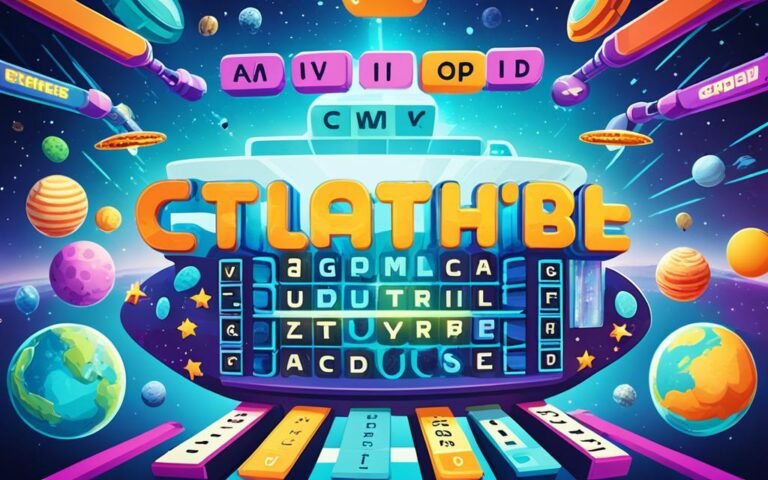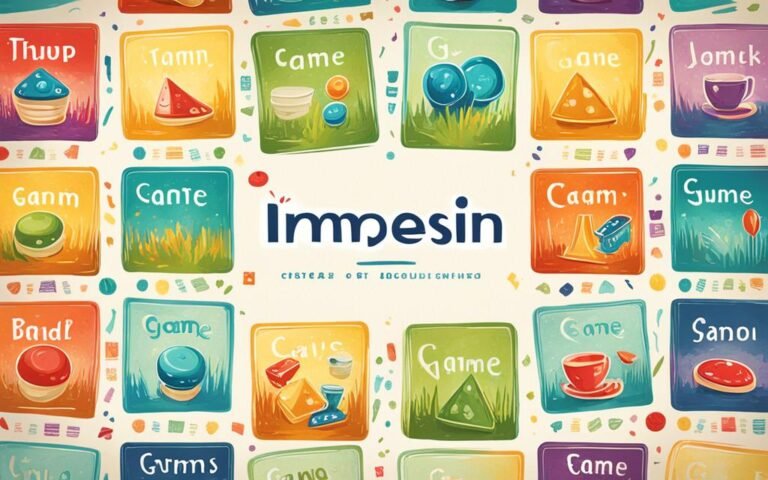Multisyllabic word games are a fantastic resource for learners seeking to enhance their linguistic skills. These games not only foster a sense of play but also facilitate the understanding of syllable structures in words, making it easier for students to decode and pronounce complex terms. In today’s age of interactive learning, multisyllabic word games serve as a bridge between traditional education and playful engagement, allowing students to improve their reading abilities through innovative methods.
What are Multisyllabic Words?

Understanding multisyllabic words is fundamental for developing reading proficiency. A multisyllabic word contains more than one syllable, which can pose challenges for early readers. However, with the right tools and approaches, like engaging games, learners can tackle these challenges head-on.
Definition and Examples
A multisyllabic word can be defined as any word that consists of two or more syllables. The breakdown of syllables plays an essential role in pronunciation, comprehension, and ultimately, fluency in reading.
For example:
- Elephant (el-e-phant)
- Incredible (in-cred-i-ble)
- Unbelievable (un-be-liev-a-ble)
Each of these words consists of multiple syllables, and recognizing their components makes them much easier to read. By dissecting words into manageable parts, learners can develop a better grasp of language structure.
Why They are Important for Reading Development
The importance of multisyllabic words in reading development cannot be overstated. Mastery over these words allows learners to tackle more advanced texts. Many academic and literary materials contain complex vocabulary, so familiarity with longer words enhances comprehension.
Furthermore, knowing how to recognize syllables helps in decoding new words. This skill not only aids in reading but also in spelling, as learners begin to understand how words are constructed. Recognizing patterns in syllable structure encourages students to predict pronunciations and meanings of unfamiliar words.
Breaking Down Syllables
Breaking down syllables involves segmenting a word into its constituent parts, which allows learners to focus on the sounds within each segment. For instance, the word “unbelievable” can be broken down phonetically into un / be / lie / va / ble.
This segmentation can be effectively taught through multisyllabic word games that encourage participation and interactive learning. As students engage with these games, they practice breaking down words smoothly, leading to improved reading fluency.
Additionally, understanding how to break down syllables forms the basis for spelling strategies and enhances overall communication skills. By mastering this skill, learners become more adept at using the English language correctly and creatively.
How Multisyllabic Word Games Aid Reading

Integrating multisyllabic word games into education creates a fun and interactive environment that fosters effective learning. These games motivate students to participate actively in their learning processes.
Making Learning Fun and Interactive
One of the primary benefits of multisyllabic word games lies in their ability to make learning enjoyable. Traditional reading exercises can often become monotonous; however, when combined with game mechanics, learning takes on a new dimension.
Games such as “Syllable Scramble” or “Word Bingo” allow students to compete against themselves or each other, promoting excitement and engagement. This competition encourages a positive attitude towards reading while allowing students to practice critical skills.
Moreover, the interactive nature of these games enables collaborative learning. Students can work together to solve puzzles or challenges, fostering social interaction and teamwork. The result is a comprehensive learning experience that transcends rote memorization.
Practicing Decoding Skills
Decoding skills are crucial for reading fluency, and multisyllabic word games provide ample opportunities to practice these skills. By engaging with various word patterns and syllable structures, students learn to decode words more effectively.
For example, games that involve matching syllables to form complete words allow learners to visualize the connections between different segments. This visual representation helps cement the relationship between sounds and symbols, reinforcing decoding strategies.
Additionally, through repeated exposure to multisyllabic words, students become more confident in their abilities to read complex terms. This confidence translates into better performance in both academic settings and everyday reading tasks.
Improving Phonological Awareness
Phonological awareness—the ability to recognize and manipulate sounds in spoken words—is a critical component of reading development. Multisyllabic word games sharpen this awareness by emphasizing sound patterns.
Games that require players to clap out syllables or identify rhyming words promote active participation in phonological activities. Through these engaging tasks, students sharpen their listening skills and enhance their ability to differentiate between similar-sounding syllables.
Improved phonological awareness contributes directly to better reading skills. When students internalize the sounds associated with syllables, they can approach new texts with greater ease and confidence, paving the way for their educational success.
Expanding Vocabulary
Engaging with multisyllabic word games naturally leads to vocabulary expansion. These games expose learners to a wide range of words, enabling them to encounter terms they may not have encountered otherwise.
When students learn multisyllabic words, they not only grasp their pronunciation but also gain insight into their meanings. Additionally, many games provide context clues that help learners deduce definitions based on word components or usage within sentences.
Through their interactions with multisyllabic words, students build a robust vocabulary foundation that translates into improved writing and communication skills. The more words they know, the better equipped they are to articulate their thoughts clearly and effectively.
Types of Multisyllabic Word Games

There is an array of multisyllabic word games available, catering to various learning styles and preferences. From digital platforms to hands-on activities, educators and parents have numerous options at their disposal.
Online Interactive Games
Digital platforms offer a treasure trove of interactive multisyllabic word games. Websites such as ABCmouse, PBS Kids, and Starfall provide engaging environments where students can explore language with the click of a button.
These online games often incorporate vibrant animations and sound cues, capturing the attention of young learners. Activities such as syllable counting games or word-building challenges immerse students in fun while simultaneously honing their reading skills.
Furthermore, many online platforms enable progress tracking, allowing teachers and parents to monitor a child’s development over time. This feature makes it easy to adjust learning paths according to individual needs.
Printable Worksheets and Activities
Printable worksheets remain a popular option for classrooms and homeschooling environments. These resources offer structured activities that reinforce concepts related to multisyllabic words.
Worksheets can include fill-in-the-blank exercises, word searches, or syllable sorting activities. Not only do these worksheets provide practice, but they also allow for differentiation based on students’ varying skill levels.
One appealing aspect of printable activities is their adaptability. Educators can customize worksheets to target specific areas of difficulty or adapt them for different age groups. This versatility ensures that all learners benefit from multisyllabic word practice.
Physical Card and Board Games
Hands-on experiences with physical card and board games can create a dynamic learning atmosphere. Games like “Syllable Snap” or “Word Wheel” encourage collaboration and friendly competition among peers.
Using tangible objects promotes a tactile learning experience, which some students find more beneficial compared to digital formats. The social aspect of playing together further enriches this experience, as students encourage one another and share strategies.
Integrating physical games into lessons not only reinforces learning objectives but also builds classroom community. It creates an inclusive environment where students feel encouraged to participate and express themselves freely.
Hands-on Syllable Activities
Beyond traditional games, educators can introduce hands-on syllable activities to engage students in creative ways. Activities such as creating syllable chains—where learners construct chains of words based on shared syllables—can foster team collaboration and creativity.
Another idea could be a “syllable scavenger hunt,” where students search for multisyllabic words around the classroom or school. These activities promote movement and exploration while reinforcing language skills.
By varying instructional strategies, teachers can cater to diverse learning styles and keep students excited about learning. These hands-on methods encourage learners to take ownership of their education while deepening their understanding of multisyllabic words.
Where to Find Multisyllabic Word Games
As interest in multisyllabic word games grows, so does the availability of resources. Educators and parents can find a variety of games across multiple platforms and stores.
Educational Websites and Platforms
Several educational websites specialize in providing engaging resources for reading development. Websites like Education.com, Teachers Pay Teachers, and Scholastic offer a wealth of multisyllabic word games aimed at enhancing literacy skills.
Many of these sites provide free resources, while others may offer premium content or subscription-based access. The key is to explore multiple options to find games that best suit individual learning needs.
Moreover, browsing through user reviews can provide insights into which games are most effective in improving reading skills. This feedback can guide parents and educators in making informed decisions about which resources to choose.
Teacher Resource Marketplaces (Free & Paid)
Teacher resource marketplaces function as hubs for educators seeking quality materials. Platforms such as Teachers Pay Teachers allow teachers to buy, sell, and share lesson plans, activities, and games focused on multitiered literacy instruction.
Educators can find a range of free and paid resources tailored for multisyllabic word games. By tapping into these markets, teachers can save time and access high-quality resources designed by fellow professionals.
This marketplace model empowers educators to connect and collaborate, fostering a community of sharing and learning that benefits everyone involved.
Bookstores and Educational Stores
For those who prefer physical copies or tactile learning experiences, local bookstores and educational supply stores often stock a range of multisyllabic word games. Visiting these stores allows educators and parents to browse options firsthand, ensuring they select games appropriate for their learners.
Many educational stores offer unique board games, flashcards, and manipulatives specifically designed to support literacy development. These materials can be especially helpful for kinesthetic learners who thrive on hands-on activities.
Visiting specialty stores also offers the chance to speak with knowledgeable staff who can recommend suitable products based on individual needs.
Creating Your Own Games
While many excellent resources are available, sometimes creating personalized games can provide the ultimate tailored experience. Designing your own multisyllabic word games allows educators to align them closely with their curriculum goals.
Consider crafting a custom bingo game, using a list of multisyllabic words pertinent to your learners’ interests or subjects. Alternatively, you might develop a matching game that pairs definitions with corresponding multisyllabic words.
Creating these games encourages creativity and innovation while ensuring that the material is relevant to each specific group of learners. By personalizing learning experiences, educators can keep students engaged and motivated.
Finding Free Multisyllabic Word Games Online
The internet abounds with free resources designed to assist learners in mastering multisyllabic words. With careful searching, educators can uncover a plethora of games that won’t strain their budgets.
Websites with Free Resources
Several websites offer free access to valuable educational resources, including multisyllabic word games. Websites like K12Reader, ReadWriteThink, and Teachers Pay Teachers have sections dedicated to free downloads, providing teachers and parents with access to quality materials.
On these sites, users can find everything from printable worksheets to interactive games that can be played in the classroom or at home. Browse through categories to discover valuable teaching aids that significantly benefit reading development.
Free Trials and Samples
Many educational platforms offer free trials or sample content to entice potential subscribers. Websites like ABCmouse and Epic! may showcase a limited selection of their materials for free, allowing educators and parents to explore their offerings before committing financially.
By taking advantage of these trials, users can assess whether the content aligns with their learners’ needs. If the trial proves beneficial, it could lead to long-term subscriptions that enhance the overall reading program.
Community-Shared Games (e.g., Wordwall, Baamboozle)
Online communities often share valuable resources, including multisyllabic word games. Platforms like Wordwall and Baamboozle allow educators to create and share interactive games designed to boost reading skills.
These community-driven platforms empower teachers to collaborate and share ideas, leading to a rich pool of resources available to all educators. By participating in these communities, teachers can access innovative game designs that may not be found in traditional marketplaces.
Furthermore, sharing games not only expands resources but also fosters a sense of belonging amongst educators. This collaboration fosters professional growth and increases engagement in the teaching profession.
Tips for Using Multisyllabic Word Games in Teaching
To maximize the effectiveness of multisyllabic word games in the classroom, consider implementing strategic practices. By aligning games with instructional goals, teachers can enhance student engagement and learning outcomes.
Choosing Games Based on Skill Level
Selecting appropriate games based on learners’ skill levels is vital to ensure efficacy. Games that are too challenging can lead to frustration, while those that are too easy may not stimulate growth.
Before introducing a game, assess students’ current abilities and identify areas requiring improvement. Once you have this understanding, choose games that present just the right amount of challenge and motivation for your learners.
It’s also essential to provide scaffolding or additional support when necessary, helping students navigate challenging content without feeling overwhelmed.
Incorporating Games into Lessons
Integrating multisyllabic word games into lesson plans can create a lively learning atmosphere. Consider using games as a warm-up activity or as a reward for completing learning objectives.
By embedding games into the fabric of your lessons, students will view them as an integral part of their learning experience rather than as isolated activities. This integration can help solidify their understanding of syllable structures and phonological awareness.
Additionally, involving students in the process of selecting or designing games can increase buy-in and motivation. When learners feel invested in their education, they are more likely to engage meaningfully with the material.
Making it a Regular Practice
Consistency is key when it comes to using multisyllabic word games effectively. Incorporating these games as a regular part of the curriculum promotes continued practice and cumulative learning.
Setting aside dedicated time during weekly lessons for multisyllabic word games allows students to anticipate and look forward to these engaging activities. Consistent exposure helps reinforce skills over time, leading to mastery.
Encouraging families to integrate these games into home practice can also extend learning beyond the classroom. By fostering a culture of ongoing practice, educators can help students develop strong reading foundations that last a lifetime.
Skills Developed by Multisyllabic Word Games
Participating in multisyllabic word games leads to the cultivation of essential linguistic skills. As students engage in these activities, they gain confidence and competence in various aspects of reading and language.
Syllabication Skills
Through multisyllabic word games, learners refine their syllabication skills, acquiring the ability to break down complex words into manageable chunks. This skill lays the groundwork for improved reading fluency, which is vital for tackling more advanced texts.
As students practice identifying syllables, they become more adept at recognizing patterns within words. This knowledge empowers them to decode new terminology quickly and accurately, further enhancing their reading capabilities.
Strengthened syllabication skills translate into greater confidence in oral reading. Students who can smoothly articulate multisyllabic words often exhibit less anxiety and hesitation when faced with challenging texts.
Phonics Rules for Longer Words
Mastery of phonics rules is essential for understanding how letters combine to create sounds in multisyllabic words. Engaging in multisyllabic word games reinforces these phonics principles, allowing students to navigate complexity more easily.
For example, understanding common prefixes and suffixes enables learners to break down long words into familiar parts, facilitating comprehension. By recognizing these building blocks, students can apply phonics rules more broadly across diverse vocabulary.
Developing phonics knowledge equips students with tools for independent learning. Rather than relying solely on memorization, students can use phonics strategies to approach unfamiliar words with confidence.
Reading Fluency
Ultimately, engaging with multisyllabic word games contributes to improved reading fluency—an essential goal for all literacy learners. As students practice decoding multisyllabic words, their overall reading speed and accuracy improve.
Fluency impacts comprehension, as readers who process text quickly can devote more cognitive resources to understanding what they’re reading. Thus, fluency becomes a critical element of effective reading instruction.
By consistently incorporating multisyllabic word games into their routines, educators can help cultivate fluent readers who approach texts with confidence and proficiency. Developing fluency opens doors to higher-level reading experiences, enriching students’ educational journeys.
Frequently Asked Questions About Multisyllabic Word Games
As multisyllabic word games garner interest among educators and parents, several questions often arise regarding their implementation and effectiveness. Addressing these concerns can provide clarity and guidance for those looking to incorporate games into learning.
What age are these games suitable for?
Multisyllabic word games are generally suitable for elementary-aged students, typically starting around first grade and continuing through middle school. However, the specific appropriateness of games can vary based on individual learner needs and developmental stages.
Younger learners may focus on basic syllables and simple multisyllabic words, while older students can tackle more complex vocabulary. It’s essential to evaluate player readiness and adjust the level of difficulty accordingly.
How often should games be played?
Incorporating multisyllabic word games into daily or weekly routines can significantly enhance the learning experience. Striking a balance between traditional reading practice and engaging game play can prevent burnout and maintain enthusiasm.
Consider setting aside dedicated time for games once or twice a week, depending on curricular demands. Consistent practice helps solidify skills and provides ongoing reinforcement for the concepts being taught.
Can games help with spelling too?
Yes, multisyllabic word games can greatly assist with spelling skills. As students engage with longer words and their syllable structures, they begin to internalize spelling patterns associated with these terms.
Through repeated exposure to multisyllabic words, learners can improve their spelling accuracy, making them more proficient writers. Moreover, understanding syllables enables students to tackle challenging words with greater ease when it comes to written expression.
Conclusion
Engaging with multisyllabic word games provides an innovative approach to developing reading skills among learners. By understanding the significance of multisyllabic words and incorporating these games into educational practices, educators can foster a love for reading while enhancing critical skills. With various types of games available—from online platforms to hands-on activities—teachers and parents have access to a wealth of resources that make learning enjoyable and effective. Consistent practice, tailored game selection, and strategic incorporation of these resources create a comprehensive learning experience that nurtures confident, capable readers.
Looking for more brain-bending challenges? Explore a variety of word games right here!




